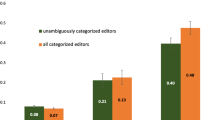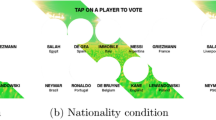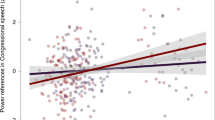Abstract
As political polarization in the United States continues to rise1,2,3, the question of whether polarized individuals can fruitfully cooperate becomes pressing. Although diverse perspectives typically lead to superior team performance on complex tasks4,5, strong political perspectives have been associated with conflict, misinformation and a reluctance to engage with people and ideas beyond one’s echo chamber6,7,8. Here, we explore the effect of ideological composition on team performance by analysing millions of edits to Wikipedia’s political, social issues and science articles. We measure editors’ online ideological preferences by how much they contribute to conservative versus liberal articles. Editor surveys suggest that online contributions associate with offline political party affiliation and ideological self-identity. Our analysis reveals that polarized teams consisting of a balanced set of ideologically diverse editors produce articles of a higher quality than homogeneous teams. The effect is most clearly seen in Wikipedia’s political articles, but also in social issues and even science articles. Analysis of article ‘talk pages’ reveals that ideologically polarized teams engage in longer, more constructive, competitive and substantively focused but linguistically diverse debates than teams of ideological moderates. More intense use of Wikipedia policies by ideologically diverse teams suggests institutional design principles to help unleash the power of polarization.
This is a preview of subscription content, access via your institution
Access options
Access Nature and 54 other Nature Portfolio journals
Get Nature+, our best-value online-access subscription
$29.99 / 30 days
cancel any time
Subscribe to this journal
Receive 12 digital issues and online access to articles
$119.00 per year
only $9.92 per issue
Buy this article
- Purchase on SpringerLink
- Instant access to full article PDF
Prices may be subject to local taxes which are calculated during checkout




Similar content being viewed by others
Code availability
Code used to gather, process and analyse the data is available at https://github.com/KnowledgeLab/wisdom-of-polarized-crowds.
Data availability
Data used in the study are available at https://github.com/KnowledgeLab/wisdom-of-polarized-crowds.
References
Gentzkow, M., Shapiro, J. & Taddy, M. Measuring Polarization in High-Dimensional Data: Method and Application to Congressional Speech (National Bureau of Economic Research, 2016).
Fiorina, M. P. & Abrams, S. J. Political polarization in the American public. Annu. Rev. Polit. Sci. 11, 563–588 (2008).
Campbell, J. E. Polarized: Making Sense of a Divided America (Princeton Univ. Press, Princeton, 2016).
Joshi, A. & Roh, H. The role of context in work team diversity research: a meta-analytic review. Acad. Manage. J. 52, 599–627 (2009).
Page, S. E. The Difference: How the Power of Diversity Creates Better Groups, Firms, Schools, and Societies (Princeton Univ. Press, Princeton, 2008).
Sunstein, C. Republic: Divided Democracy in the Age of Social Media (Princeton Univ. Press, Princeton, 2017).
Mutz, D. C. Hearing the Other Side: Deliberative Versus Participatory Democracy (Cambridge Univ. Press, Cambridge, 2006).
Bishop, B. The Big Sort: Why the Clustering of Like-Minded America is Tearing Us Apart (Houghton Mifflin Harcourt, Boston, 2009).
DellaPosta, D., Shi, Y. & Macy, M. Why do liberals drink lattes? Am. J. Sociol. 120, 1473–1511 (2015).
Gauchat, G. Politicization of science in the public sphere: a study of public trust in the United States, 1974 to 2010. Am. Sociol. Rev. 77, 167–187 (2012).
Sarewitz, D. How science makes environmental controversies worse. Environ. Sci. Policy 7, 385–403 (2004).
Zhao, X., Leiserowitz, A. A., Maibach, E. W. & Roser-Renouf, C. Attention to science/environment news positively predicts and attention to political news negatively predicts global warming risk perceptions and policy support. J. Commun. 61, 713–731 (2011).
Shi, F., Shi, Y., Dokshin, F. A., Evans, J. A. & Macy, M. W. Millions of online book co-purchases reveal partisan differences in the consumption of science. Nat. Hum. Behav. 1, 0079 (2017).
Benkler, Y. The Wealth of Networks: How Social Production Transforms Markets and Freedom (Yale Univ. Press, New Haven, 2006).
Bakshy, E., Messing, S. & Adamic, L. A. Exposure to ideologically diverse news and opinion on Facebook. Science 348, 1130–1132 (2015).
Pariser, E. The Filter Bubble: How the New Personalized Web is Changing What We Read and How We Think (Penguin, London, 2011).
Del Vicario, M. et al. The spreading of misinformation online. Proc. Natl Acad. Sci. USA 113, 554–559 (2016).
Taber, C. S. & Lodge, M. Motivated skepticism in the evaluation of political beliefs. Am. J. Polit. Sci. 50, 755–769 (2006).
Miller, J. M., Saunders, K. L. & Farhart, C. E. Conspiracy endorsement as motivated reasoning: the moderating roles of political knowledge and trust. Am. J. Polit. Sci. 60, 824–844 (2016).
Kahan, D. M., Peters, E., Dawson, E. C. & Slovic, P. Motivated numeracy and enlightened self-government. Behav. Public Policy 1, 54–86 (2017).
Hart, P. S. & Nisbet, E. C. Boomerang effects in science communication: how motivated reasoning and identity cues amplify opinion polarization about climate mitigation policies. Commun. Res. 39, 701–723 (2012).
Mannix, E. & Neale, M. A. What differences make a difference? The promise and reality of diverse teams in organizations. Psychol. Sci. Public Interest 6, 31–55 (2005).
Hong, L. & Page, S. E. Groups of diverse problem solvers can outperform groups of high-ability problem solvers. Proc. Natl Acad. Sci. USA 101, 16385–16389 (2004).
Woolley, A. W., Chabris, C. F., Pentland, A., Hashmi, N. & Malone, T. W. Evidence for a collective intelligence factor in the performance of human groups. Science 330, 686–688 (2010).
Nielsen, M. Reinventing Discovery: The New Era of Networked Science (Princeton Univ. Press, Princeton, 2012).
Fleming, L., Mingo, S. & Chen, D. Collaborative brokerage, generative creativity, and creative success. Adm. Sci. Q. 52, 443–475 (2007).
Wuchty, S., Jones, B. F. & Uzzi, B. The increasing dominance of teams in production of knowledge. Science 316, 1036–1039 (2007).
Nielsen, M. W. et al. Opinion: gender diversity leads to better science. Proc. Natl Acad. Sci. USA 114, 1740–1742 (2017).
Mill, J. S. & Mehta, U. On Liberty (Henry Regnery Company, Washington D.C., 1955).
Raymond, E. The cathedral and the bazaar. Know. Techn. Policy 12, 23–49 (1999).
Greenstein, S. & Zhu, F. Is Wikipedia biased? Am. Econ. Rev. 102, 343–348 (2012).
Greenstein, S. & Zhu, F. Open content, Linus’ law, and neutral point of view. Inform. Syst. Res. 27, 618–635 (2016).
Viegas, F., Wattenberg, M., Kriss, J. & Ham, F. Talk before you type: coordination in Wikipedia. in 40th Annual Hawaii International Conference on System Sciences (HICSS'07) https://doi.org/10.1109/HICSS.2007.511 (IEEE, 2007).
Wilkinson, D. M. & Huberman, B. A. Cooperation and quality in Wikipedia. in Proc. 2007 International Symposium on Wikis (WikiSym ‘07) 157–164 (ACM, 2007).
Kittur, A. & Kraut, R. E. Harnessing the wisdom of crowds in Wikipedia. in Proc. 2008 Conference on Computer Supported Cooperative Work (CSCW ‘08) 37–46 (ACM, 2008).
Collins, R. Violence: A Micro-Sociological Theory (Greenwood Publishing Group, Westport, 2009).
Wulczyn, E., Thain, N. & Dixon, L. Ex machina: personal attacks seen at scale. in Proc. 26th International Conference on World Wide Web (WWW ‘17) 1391–1399 (International World Wide Web Conferences Steering Committee, 2017).
Wikipedia: shortcut directory. Wikipedia https://en.wikipedia.org/wiki/Wikipedia:Shortcut_directory (2018).
Cheng, J., Danescu-Niculescu-Mizil, C. & Leskovec, J. How community feedback shapes user behavior. Preprint at http://arxiv.org/abs/1405.1429 (2014).
Cheng, J., Danescu-Niculescu-Mizil, C. & Leskovec, J. Antisocial behavior in online discussion communities. Preprint at http://arxiv.org/abs/1504.00680 (2015).
Mercier, H. The argumentative theory: predictions and empirical evidence. Trends Cogn. Sci. 20, 689–700 (2016).
Sobel Fitts, A. Welcome to the Wikipedia of the alt-right. Wired https://www.wired.com/story/welcome-to-the-wikipedia-of-the-alt-right/ (2017).
Greenstein, S., Gu, Y. & Zhu, F. Ideological segregation among online collaborators: evidence from Wikipedians. Working Paper 17-028 (2016).
Phillips, K. W., Liljenquist, K. A. & Neale, M. A. Is the pain worth the gain? The advantages and liabilities of agreeing with socially distinct newcomers. Pers. Soc. Psychol. Bull. 35, 336–350 (2009).
Nam, H. H., Jost, J. T. & Van Bavel, J. J. "Not for all the tea in china!" political ideology and the avoidance of dissonance-arousing situations. PLoS One 8, e59837 (2013).
Jemielniak, D. Common Knowledge?: An Ethnography of Wikipedia (Stanford Univ. Press, Palo Alto, 2014).
Sproull, L. & Kiesler, S. Computers, Networks and Work. in Readings in Human–Computer Interaction. (eds. Baecker, R. M., Grudin, J., Buxton, W. A. S., & Greenberg, S.) 755–761 (Elsevier, Amsterdam, 1995).
Fairbanks, E. Wiki Woman. The New Republic https://newrepublic.com/article/63288/wiki-woman (2008).
Bohnet, I. What Works: Gender Equality by Design (Harvard Univ. Press, Cambridge, 2016).
Dahlerup, D. The Impact of Gender Quotas (Oxford Univ. Press, Oxford, 2012).
Besley, T., Folke, O., Persson, T. & Rickne, J. Gender quotas and the crisis of the mediocre man: theory and evidence from Sweden. Am. Econ. Rev. 107, 2204–2242 (2017).
Halfaker, A. Interpolating quality dynamics in Wikipedia and demonstrating the Keilana effect. in Proc. 13th International Symposium on Open Collaboration (OpenSym ‘17) https://doi.org/10.1145/3125433.3125475 (ACM, 2017).
Category: Liberalism in the United States. Wikipedia https://en.wikipedia.org/wiki/Category:Liberalism_in_the_United_States (2018).
Category: Conservatism in the United States. Wikipedia https://en.wikipedia.org/wiki/Category:Conservatism_in_the_United_States (2018).
Category: Social Issues. Wikipedia https://en.wikipedia.org/wiki/Category:Social_issues (2018)
Category: Scientific Disciplines. Wikipedia https://en.wikipedia.org/wiki/Category:Scientific_disciplines (2018).
Warncke-Wang, M., Cosley, D. & Riedl, J. Tell me more: an actionable quality model for Wikipedia. in Proc. 9th International Symposium on Open Collaboration (WikiSym ‘13). https://doi.org/10.1145/2491055.2491063 (ACM, 2013).
Harrison, D. A. & Klein, K. J. What’s the difference? Diversity constructs as separation, variety, or disparity in organizations. Acad. Manag. Rev. 32, 1199–1228 (2007).
Research: Wikipedia + Politics. Wikipedia https://meta.wikimedia.org/wiki/Research:Wikipedia_%2B_Politics (2018).
Acknowledgements
We acknowledge funding from the National Science Foundation SBE-1829366, John Templeton Foundation to the Metaknowledge Network and Air Force Office of Scientific Research FA9550-15-1-0162, and computation support from Cloud Kotta. We also acknowledge support from the Data@Carolina initiative and thank H. Guo for helping with some of the computations. The funders had no role in study design, data collection and analysis, decision to publish or preparation of the manuscript.
Author information
Authors and Affiliations
Contributions
All authors designed the research, interpreted the results and drafted the paper. F.S., M.T. and E.D. gathered the data. F.S. designed the code and F.S. and M.T. analysed the data.
Corresponding authors
Ethics declarations
Competing interests
The authors declare no competing interests.
Additional information
Publisher’s note: Springer Nature remains neutral with regard to jurisdictional claims in published maps and institutional affiliations.
Supplementary information
Supplementary Information
Supplementary Figures 1–3, Supplementary Tables 1–8, Supplementary Methods 1–7, Supplementary Discussions 1 and 2, and Supplementary References.
Rights and permissions
About this article
Cite this article
Shi, F., Teplitskiy, M., Duede, E. et al. The wisdom of polarized crowds. Nat Hum Behav 3, 329–336 (2019). https://doi.org/10.1038/s41562-019-0541-6
Received:
Accepted:
Published:
Issue Date:
DOI: https://doi.org/10.1038/s41562-019-0541-6



